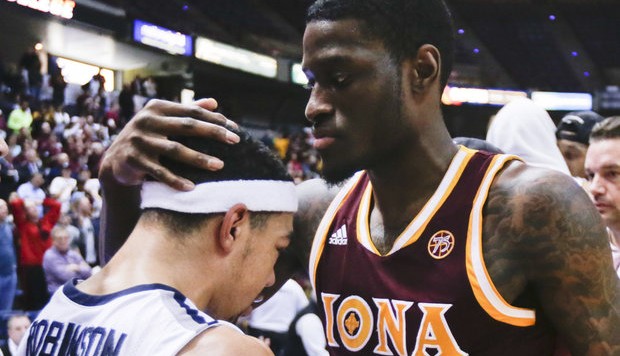Monday, Bloody Monday.
The Monmouth Hawks and the Valparaiso Crusaders, two teams with complicated mid-major resumes, could have reduced the size of the bubble had they won their respective conference tournaments. Given that the Wichita State Shockers failed to win the Missouri Valley Conference Tournament over the weekend, the bubble was already growing as March Madness gathered steam. Various power-conference teams already on the bubble did not want extra company.
So much for that hope. If the bubble is a train on the way to work, passengers just got squished together a little more on the commute to Selection Sunday.
If this was a Bloody Monday, the Selection Show will be a Bloody Sunday for the teams left out of the NCAA tournament. It’s just the way it is — it’s the way it always is.
Such is the Madness of March.
Let’s first enable you to view the bodies of work produced by Monmouth and Valparaiso. Last week, TSS staff writer Yesh Ginsburg examined Wichita State’s resume and overall bubble case in the event of a loss in Arch Madness, which did indeed occur.
Monmouth’s and Valpo’s resumes are hardly the same, but that doesn’t mean there’s clear separation between the two. Monmouth is noticeably strong in terms of road and neutral wins. Valparaiso doesn’t have Monmouth’s collection of bad losses. Monmouth was more ambitious in its scheduling, but the Hawks were (are) brutally unlucky in that two power-conference victims — UCLA and Georgetown — have turned into bad teams this season. Last year, that same pair of wins would have Monmouth in the field, without too much of a question.
So it goes.
You’re not going to get an argument that Monmouth and (or) Valpo should definitely be in or out of the field of 68. We’re not going to play that game this week, because bubble questions such as the ones posed by the Hawks and Crusaders are rarely — if ever — neat and tidy.
The age-old question presented by mid-major bubble teams is the question we — and most especially, the Selection Committee — must wrestle with the next several days: Measured against power-conference bubble teams, how much credit should a mid-major receive for comparatively smaller accomplishments… but with fewer bites at the apple?
It is not a point of dispute that mid-majors can’t play as many high-end teams as power-conference teams do. The power conferences provide a much more open and readily available gateway to high-end scheduling, especially at home. Mids will never be able to match the same volume or quality in a schedule.
Consider two teams very much on the bubble from the ACC: Pittsburgh and Syracuse. The loser of that 8-9 game in the ACC Tournament (Wednesday) will be squarely on the bubble come Selection Sunday, possibly one of the first four in or out. Yet, the Panthers and Orange both play a full roster of ACC opponents. That collection of opponents elevates overall strength of schedule to a level the mids will rarely if ever match. Monmouth played a bunch of power-conference teams, but could not land the high-profile opponents Pitt and Syracuse encountered within the ACC regular season schedule.
Moreover, given how a team such as Texas Tech was able to schedule home games against a lot of mid-majors and other teams strategically selected to manipulate the RPI, it’s clear that sorting games based on the RPI Top 50 or 100 is a process in which mid-majors will generally come up short.
This is all a longer way of saying that when it comes to a bubble comparison between a mid-major such as Monmouth (or Valpo) and a high-major such as Pittsburgh (or Syracuse), the high-major will almost always have the stronger schedule and more notches under the belt… but with noticeably more opportunities to play tough opponents, especially at home. When viewed through a strict numerical prism — or perhaps, to be more precise about it, a specific kind of numerical prism — the mid-majors will generally lose.
Should college basketball and its Selection Committee remain beholden to certain comparisons, or should others enter — even dominate — the conversation in this and future seasons?
That’s the question we must ask today.
“In or out?” is a question which can wait until Sunday afternoon in Indianapolis.

